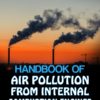There is much uncertainty surrounding climate change projections. General circulation models (GCMs) manufacture a large variety of potential future climates, particularly at the country level. it’s conjointly unclear however the world economy can evolve over the following century. this implies that completely different emission situations ar known and sculpturesque supported projected populations, economic process, and technological progress. The state of the economy is an objective fact, but the future projection of the possible consequences of climate mitigation policy for the economy is far more complex. As such, it is open to framing by political actors seeking to mobilize public support for their position. Economic concerns surrounding climate change can be framed in terms of their costs and benefits. Some work has shown that cost-framed messages are effective in influencing climate change attitudes and behaviors.
This comprehensive book illustrates innovative approaches to the formulation of environmental policy by budding the relevant concepts and techniques of economics by establishing a relationship between the environment and the economy. The first chapter specifically focuses on three types of frames, economic costs, and benefits associated with climate mitigation, appeals to conservative and free-market values and principles, and uncertainties and risks surrounding climate change. This book succeeds with the presentation on the innovation effects of renewable energy policies and their interaction and economic impacts of climate change on agriculture. A study on the implications of climate change for Ghana’s economy is covered next.
The book furthermore presents wide-ranging coverage on the generalizable integrated natural capital methodology for targeting investment in coastal defense; the economics of peatland restoration; risk trade-off method for use in safety project appraisal responses; and the economic impacts of Japan’s renewable energy sector and the feed-in tariff system. This information is needed for prioritizing policy responses and adaptation investments, especially in the long run. Moreover, most quantitative studies consider only a few global climate change projections representing a small share of potential future outcomes. Knowledge of the full range of potential outcomes and risk is obviously desirable in the elaboration of robust development strategies. This book will be of value to the students, scientists, researchers, and other stakeholders associated with the subject area.














Michele –
Hello there! Do you know if they make any plugins to assist with SEO?
I’m trying to get my website to rank for some targeted keywords but I’m not seeing very good gains.
If you know of any please share. Thanks! You can read similar text here: Change your life